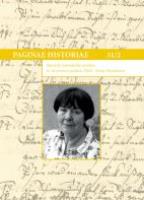Český archivář v Římě. Hynek Kollmann jako cestovatel, pozorovatel a společník
A Bohemian Archivist in Rome: Hynek Kollman – A Traveller, Observer and Companion
Author(s): Jaroslav Pánek Subject(s): History, Library and Information Science, Archiving, Modern Age, 19th Century, Pre-WW I & WW I (1900 -1919)
Published by: Národní archiv
Keywords: editors; Italian archives; foreign trips; Czech-Italian relations; archival sources; estates; diaries
Summary/Abstract: Hynek Kollmann (1864–1938) is permanently linked to the Czech Lands Archives in Prague where he spent most of his professional life (even was appointed its titular director) and to the archival research in Rome. Unlike the majority of researchers, Kollmann did not address himself to the Vatican fonds but rather to the unexplored Congregatio de Propaganda fide archive where he discovered an extraordinarily valuable collection of sources about the re-Catholicisation of Central Europe in the 17th century. He earned international renown for his extensive – unfortunately incomplete – edition Acta Sacrae Congregationis de Propaganda fide res gestas bohemicas illustrantia (1923–1954).By way of Kollmann’s example, the study seeks to capture the lifestyle of the most agile archive researchers who set out to Rome from Bohemia in the late 19th and early 20th centuries, acting as short time go-betweens for the Bohemian intellectual society and Italian milieu. The analysis of Kollmann’s fragmentary estate, deposited in the National Archives in Prague (namely his diaries from 1891–1892 with regard to his correspondence), uncovers a multipotential person – a traveller with geographical and historical horizons; a perceptive observer of past relics as well as political, social, and economic changes in Italy; and a person with extensive social contacts. During his sojourns to Rome, Kollmann built a network of contacts in several aspects. First of all, he settled in the Bohemian community in Rome that revolved around two centres: Bohemicum, a college for Bohemian theologians with the crucial Vice-Rector František Zapletal (Kollmann’s friend and intermediary within Catholic hierarchy), and a group of artists working in Palazzo Venezia (where the successful painter Beneš Knüpfer, another friend of Kollmann, left a significant trace). His relationship with the representatives of Austrian diplomacy and the Austrian Historical Institute (especially Theodor von Sickel, director of the latter) were rather formal for he argued with them about Czech-German relations and the development of the Habsburg Empire. Kollmann established live contacts with the inhabitants of Rome who enabled him to gain knowledge about everyday life in the Italian metropolis and about the tension between the adherents of papal curia and the royal court.Kollmann’s acquaintance with Bohemian politicians arriving in Rome was of special significance; he was their guide conversant with the local environment and a go-between especially in relation to the ecclesiastical circles. Among Kollmann’s short-time clients were the deputies of the Bohemian and Moravian diets, including the long-term Bohemian political leader František Ladislav Rieger. In relation to them, the conservative Catholicism and strong Bohemian patriotism of Hynek Kollmann manifested itself and strengthened.
Journal: Paginae Historiae
- Issue Year: 31/2023
- Issue No: 2
- Page Range: 191-222
- Page Count: 32
- Language: Czech

